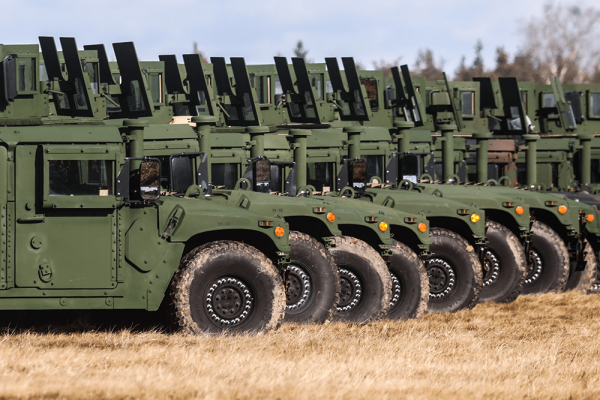Last month Congress approved an annual military budget of $858 billion, a staggering new record.
To put that sum into perspective, national security expert William D. Hartung estimates that “the $80 billion increase from the fiscal year 2022 to 2023 alone is higher than the entire military budget of every nation in the world but China.” The Pentagon itself reported that Congress had added more than $58 billion in funding to the Defense Department beyond what the department had even requested. These are astronomical, nearly incomprehensible numbers, yet there is little discussion on Capitol Hill over the magnitude of our government’s military spending: The Senate passed the most recent Pentagon budget by an overwhelming bipartisan vote of 83-11.
As followers of Jesus, bringing “good news to the poor” and promoting peace should be at the center of our worldview and vocation. In our advocacy work at Sojourners, we constantly find ourselves trying to convince our country’s decision-makers to prioritize government spending that provides a lifeline to people experiencing poverty. Unfortunately, we have often found that securing adequate resources to help people lift themselves out of poverty is a constant uphill battle. While I believe in the importance of fiscal responsibility, when members of Congress become concerned about the national deficit, the programs that wind up on the chopping block are usually the programs that offer a safety net to those who are most vulnerable — while military spending continues unchecked.
The consequences of our nation’s massive military spending are heartbreaking. After 9/11, military spending increased dramatically to finance the global “war on terror,” which anthropologist David Vine estimates has killed 4.5 million people worldwide. Brown University’s Costs of War project assesses that these wars have also displaced 38 million people and cost the U.S. $8 trillion. The U.S. maintains an unparalleled military presence around the world in the form of about 750 military bases in at least 80 countries and colonies. The size and scale of this presence are the hallmarks of empire.
But there are other consequences as well: Excessive military spending places intense downward pressure on the rest of the budget, particularly on programs of social uplift. “A nation that continues year after year to spend more money on military defense than on programs of social uplift is approaching spiritual death,” said Rev. Martin Luther King in his 1967 speech “A Time to Break the Silence.” “America would never invest the necessary funds or energies in rehabilitation of its poor so long as adventures like Vietnam continued to draw men and skills and money like some demonic, destructive suction tube.”
This uphill battle continues, as evidenced though Congress’ failure to renew the expansion of the Child Tax Credit during the pandemic, which lifted millions of children out of poverty.
We should want our government to be good stewards of our tax dollars; it’s good for government programs to be as effective as possible. Yet one central hypocrisy of our nation’s addiction to military spending is the degree to which social programs receive such disproportionate scrutiny and criticism for waste, fraud, and abuse. When we compare Congressional scrutiny of safety net programs to Congressional scrutiny of the Pentagon budget — or rather to the lack thereof — we see an indefensible and morally irreconcilable double standard. The astonishing truth is that unlike every other federal agency, the Defense Department only began conducting comprehensive financial audits in 2017 and has never passed. Its most recent audit, released in November, was its fifth straight failure with the Pentagon only able to accurately account for 39 percent of its $3.5 trillion in assets. Think about that for a moment: The military with the largest budget in the world can only account for less than half of its assets. What would you think if you heard this about another government program? What if you heard this about Russia’s military?
But the problems are bigger than failed bookkeeping: For the last decade, including the most recent budget, private weapons companies have received more than half of all military spending. How do these titanic contracts — which redistribute taxpayer dollars into private hands — keep thriving despite infamous levels of price gouging and cost overruns in the military sector? The answer, unfortunately, is that the contracts are bought and paid for via campaign contributions and lobbying. Between 2001 and 2020, military contractors gave $283 million in campaign contributions, and the level of contributions tripled from 2002 to 2020. Military contractors also lobby extensively, spending $119 million last year, such that four of the top 10 corporate spenders on lobbying last year were military contractors. Another way to think about the impact of military contractor lobbying is that top firms spent $1 billion on lobbying during the Afghan war while receiving more than $2 trillion in federal contracts over the length of the war and achieving 188 percent growth in their federal funding.
This lack of accountability and waste should be of deep concern to all Americans, regardless of your partisan or ideological persuasion. We can all agree that wasteful and unaccountable spending does nothing to keep our nation safer, let alone promote global security. This new, divided Congress can even present some new opportunities to bring together strange bedfellows such as the ultra-conservative Freedom Caucus and the left-wing Progressive Caucus to address shared concerns about unnecessary military spending.
To be clear: Wanting to rein in military spending isn't the same thing as being anti-military. But we should also recognize that we serve the Prince of Peace, not the Prince of War, and the way of Jesus is one that must also seek nonviolent resolutions amid the inevitability of human conflict.
In the face of these stark choices, we must heed the words of the prophet Micah, who proclaims God’s promise that there will be peace among nations and everyone will live without fear.
“Come, let us go up to the mountain of the Lord, to the temple of the God of Jacob. He will teach us his ways, so that we may walk in his paths. The law will go out from Zion, the word of the Lord from Jerusalem. He will judge between many peoples and will settle disputes for strong nations far and wide. They will beat their swords into plowshares and their spears into pruning hooks. Nation will not take up sword against nation, nor will they train for war anymore.
Everyone will sit under their own vine and under their own fig tree, and no one will make them afraid” (Micah 4:2-4).
Echoing Micah’s prophetic words, we must cast a new vision of U.S. and global security that rejects the dangers of imperialism and the primacy of military might alone. We must raise the hard questions around what actually makes us safer in an increasingly multipolar and interdependent world? As Micah reminds us, our security is inextricably linked to people’s dignity, to people having their own fig tree, or in contemporary terms, to sustainable development. What would happen if we used some of the money currently funding weapons and bases and invested it in efforts to promote peacebuilding, diplomacy, and sustainable development? Imagine if Congress allocated one-tenth of military spending to fighting poverty and enhancing nonviolent responses to conflict by investing in just peace diplomacy, nonviolent tactics and strategy, unarmed civilian protection, social cohesion trainings, and other effective non-militarized approaches to making peace.
At the end of the day, it is not possible to be serious about ending poverty in the U.S. or around the world without simultaneously working to power down the “destructive suction tube” of wasteful military spending. While many faith and anti-poverty leaders have long been aware and concerned about the pernicious impact of excessive military spending, they have often remained far too quiet. Now is the time to loudly proclaim the imperative to redirect unnecessary military spending to the most effective programs of social uplift, even as we work to spark a long overdue dialogue around what investments and kind of military will bring us the greatest and most sustainable security.
Got something to say about what you're reading? We value your feedback!





